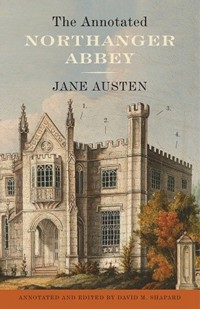From the desk of Laurel Ann Nattress: In honor of lovers everywhere we are highlighting some of Jane Austen’s insights on courtship, love, and marriage in her novels, and in her life, on the most romantic day of the year, Valentine’s Day. Here are 24 of the best quotes to include in a card, express... Continue Reading →
Celebrating Jane Austen Day 2014 with 75 Sensational Quotes That Every Janeite Should Not Live Without
Jane Austen-themed Twelfth Night Cake by Sprinkles Bakes Today is Jane Austen 239th birthday. Born on 16 December 1775 at Steventon Rectory in Hampshire, England, her many admirers have proclaimed her birthday as Jane Austen Day and are celebrating around the world in creative and diverse ways. Please join us and the Jane Austen Centre Facebook... Continue Reading →
Northanger Abbey: An Annotated Edition, by Jane Austen, edited by Susan J. Wolfson – A Review
Harvard University Press is seriously spoiling me. With the release of Northanger Abbey: An Annotated Edition, they have now produced five glitzy coffee table editions of Jane Austen’s major novels. What true Janeite could possibly pass up an unabridged first edition text, an extensive introduction, and notes by an Austen scholar, full-color illustrations, over-sized hardcover... Continue Reading →
The Annotated Northanger Abbey, by Jane Austen, annotated & edited by David M. Shapard – A Review
From the desk of Heather Laurence: “And now, Henry,” said Miss Tilney, “that you have made us understand each other, you may as well make Miss Morland understand yourself … Miss Morland is not used to your odd ways.” “I shall be most happy to make her better acquainted with them.” Modern readers encountering Northanger... Continue Reading →
Penguin Clothbound Classics: Jane Austen: The Complete Works, 7-Book Boxed Set, Designed by Coralie Bickford-Smith
From the desk of Laurel Ann Nattress: Happy dance in the Jane Austen book world today. With the release of Coralie Bickford-Smith’s new cover design of Love and Freindship and Other Youthful Writings, the Penguin Clothbound Classics set of Jane Austen novels now includes seven books: Sense and Sensibility, Pride and Prejudice, Mansfield Park, Emma,... Continue Reading →
Northanger Abbey, by Jane Austen (Naxos AudioBooks), read by Juliet Stevenson – A Review
Northanger Abbey is the exuberant lesser-known child of Jane Austen’s oeuvre. Even though it was her first novel to be completed and sold in 1803, much to Austen’s bemusement it was never published and languished with Crosby & Co for thirteen years until she bought it back for the ten pounds that the publisher had... Continue Reading →
Austen at Large: Oh Henry! What a good Valentine
A look at Henry Tilney. An all around great guy!
Isabella Thorpe as a modern blogger!
From the desk of Virginia Claire: In this past week I have been finishing Northanger Abbey and as wonderful as the romance is in it, I think one of the most important lessons is about friendship. Catherine learns throughout the novel how to better read people, in particular her friends. She starts out completely fooled by... Continue Reading →
Northanger Abbey: Henry Tilney – so becomingly important!
...in the course of a few minutes, she found herself with Henry in the curricle, as happy a being as ever existed. A very short trial convinced her that a curricle was the prettiest equipage in the world; the chaise and four wheeled off with some grandeur, to be sure, but it was a heavy... Continue Reading →
Catherine Morland is a delight!
A look at Catherine Morland from Northanger Abbey
Jane Austen and the Seven Deadly Sins: Pride and Vanity
Vanity was the beginning and the end of Sir Walter Elliot's character; vanity of person and of situation. He had been remarkably handsome in his youth; and, at fifty-four, was still a very fine man. Few women could think more of their personal appearance than he did; nor could the valet of any new made... Continue Reading →
Northanger Abbey Chapters 29-31: Summary, Musings & Discussion: Day 20 Giveaway
On entering the room, the first object she beheld was a young man whom she had never seen before. With a look of much respect, he immediately rose, and being introduced to her by her conscious daughter as "Mr. Henry Tilney," with the embarrassment of real sensibility began to apologize for his appearance there, acknowledging... Continue Reading →











